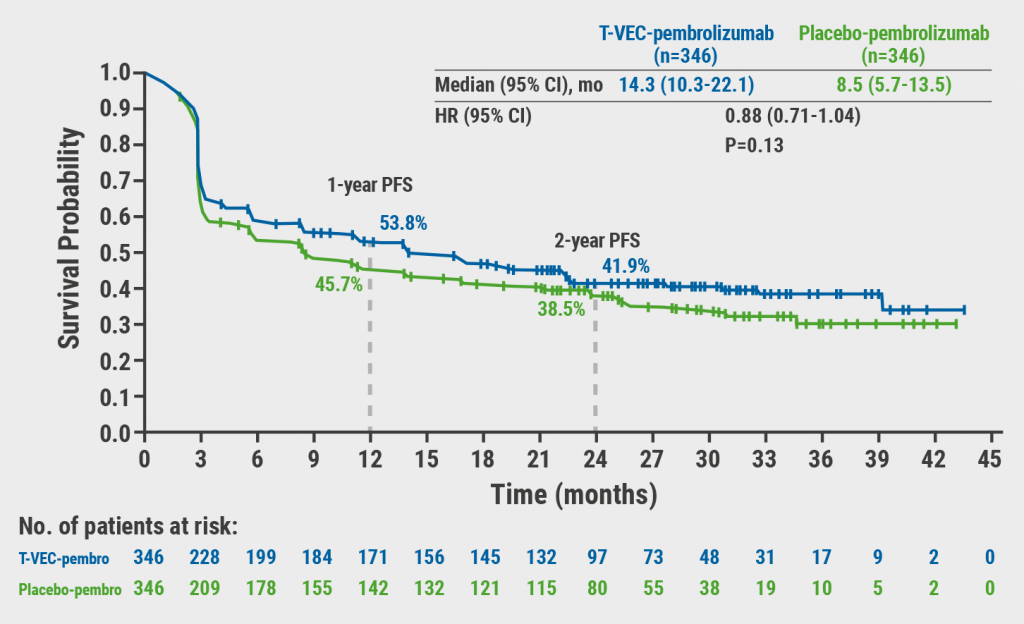Previous research showed that oncolytic virotherapy with talimogene laherparepvec (T-VEC) may improve the efficacy of anti-PD-1 therapy in patients with advanced melanoma by changing the tumour microenvironment [1]. In the phase 3 MASTERKEY-265 trial (NCT02263508), 692 patients with unresectable stage IIIB-IVM1c, anti-PD-1-naïve melanoma with injectable lesions were randomised 1:1 to T-VEC/pembrolizumab or placebo/pembrolizumab. T-VEC was given at ≤4x106 plaque-forming units (PFU) followed by ≤4x108 PFU 3 weeks later and every 2 weeks until dose 5, and every 3 weeks thereafter. Pembrolizumab was given intravenously 200 mg every 3 weeks. Dual primary endpoints were progression-free survival (PFS) and overall survival (OS). Secondary endpoints included objective response rate (ORR), complete response rate (CRR), durable response rate (DRR), duration of response (DOR), and safety. Dr Helen Gogas (National and Kapodistrian University of Athens, Greece) presented the first results of MASTERKEY-265 [2].
The primary endpoints did not reach statistical significance. After a median follow-up of 31.0 months, median PFS was 14.3 months for the T-VEC/pembrolizumab-treated patients and 8.5 months for the placebo/pembrolizumab-treated patients (HR 0.86; P=0.13); 1-and 2-year PFS rates were 53.8% versus 45.7% and 41.9% versus 38.6%, respectively (see Figure).
Figure: PFS, primary endpoint of MASTERKEY-265 [2]

Median OS was not reached for the T-VEC/pembrolizumab arm and 49.2 months for the placebo/pembrolizumab (HR 0.96; P=0.74). OS was not expected to achieve statistical significance at the primary OS analysis. Safety profiles were generally comparable between treatment arms.
“Combining T-VEC and pembrolizumab does not significantly improve PFS or OS in patients with unresectable stage III/IVM1 melanoma,” concluded Dr Gogas.
- Ribas A, et al. Cell. 2017;170:1109-1119.
- Gogas HJ, et al. MASTERKEY-265: A phase III, randomized, placebo (Pbo)-controlled study of talimogene laherparepvec (T) plus pembrolizumab (P) for unresectable stage IIIB–IVM1c melanoma (MEL). Abstract 1037O, ESMO Congress 2021, 16–21 September.
Copyright ©2021 Medicom Medical Publishers
Posted on
Previous Article
« Durable intracranial responses with nivolumab/ipilimumab Next Article
Updated results of SECOMBIT trial »
« Durable intracranial responses with nivolumab/ipilimumab Next Article
Updated results of SECOMBIT trial »
Table of Contents: ESMO 2021
Featured articles
Breast Cancer
Trastuzumab deruxtecan triples PFS
Novel conjugate meets primary endpoint
Longest survival benefit from first-line CDK4/6 inhibitor
Meta-analysis shows 6-months adjuvant trastuzumab is optimal
Double-positive results for triple-negative metastatic breast cancer
Survival after neoadjuvant therapy with trastuzumab-lapatinib plus chemotherapy
Postmenopausal breast cancer: extended letrozole reduces recurrence
Asian women also benefit from palbociclib plus letrozole
No PEARLs of survival with palbociclib plus endocrine therapy compared with capecitabine, but QoL better
Gastrointestinal Cancer
Neoadjuvant chemotherapy potential alternative to neoadjuvant chemoradiotherapy in LARC
Immune chemo-sensitisation looks promising in microsatellite-stable mCRC
Adagrasib shows promising clinical activity in heavily pretreated KRAS-mutated CRC
Automated detection of microsatellite status on unstained samples in early colon cancer
Consistent benefit of anti-PD-1 therapy for oesophageal and gastric cancer
HIPEC in gastric cancer with peritoneal metastases
ctDNA highly predictive in HER2-positive, advanced gastric or gastro-oesophageal junction cancer
Lung Cancer
Robust anticancer activity of trastuzumab deruxtecan in HER2-mutated NSCLC
Nivolumab/ipilimumab continues to provide survival benefit in unresectable MPM
Adjuvant atezolizumab lowers relapse rate in resected NSCLC
Three-year OS follow-up from CASPIAN trial
TCR clonality predicts pembrolizumab response in NSCLC
Melanoma
Adjuvant immunotherapy reduces risk of disease recurrence in stage II melanoma
IFN-γ signature predicts response to immunotherapy
Updated results of SECOMBIT trial
Combining T-VEC and pembrolizumab does not significantly improve survival in advanced, unresectable melanoma
Durable intracranial responses with nivolumab/ipilimumab
Genitourinary Cancer
TKI drug-free interval strategy not detrimental to conventional continuation strategy in RCC
Modified ipilimumab schedule reduces risk of grade 3/4 adverse events
Optimal neoadjuvant dose ipilimumab/nivolumab in stage III urothelial cancer
Better survival with neoadjuvant dose-dense MVAC regimen in MIBC
PARP inhibitor rechallenge improves PFS in ovarian cancer
Pembrolizumab prolongs survival in persistent, recurrent, or metastatic cervical cancer
Pembrolizumab has durable effect in previously treated MSI-H/dMMR advanced endometrial cancer
HRR mutational status is prognostic and predictive biomarker olaparib activity
Haematological Cancer
Mutational analyses are predictive in malignant lymphomas
Low numbers of M2 macrophages in tumour microenvironment associated with superior response to immunotherapy in Hodgkin lymphoma
COVID-19
Adequate response to SARS-CoV-2 vaccine in cancer patients
Cancer patients more likely to die from COVID-19 when hospital admittance is required
Third global survey of the ESMO Resilience Task Force
High COVID-19 mortality in Swiss cancer patients
Basic Science & Translational Research
Neutrophils negatively correlate with response to anti-PD-1 monotherapy in dMMR tumours
Tetraspecific ANKETs harnesses innate immunity in cancer therapies
Early ctDNA reduction in metastatic uveal melanoma correlates better with OS than RECIST response
Gut microbiota as a potential predictive biomarker
Related Articles

November 17, 2021
Letter from the Editor
November 19, 2021
Mutational analyses are predictive in malignant lymphomas
© 2024 Medicom Medical Publishers. All rights reserved. Terms and Conditions | Privacy Policy
HEAD OFFICE
Laarderhoogtweg 25
1101 EB Amsterdam
The Netherlands
T: +31 85 4012 560
E: publishers@medicom-publishers.com

